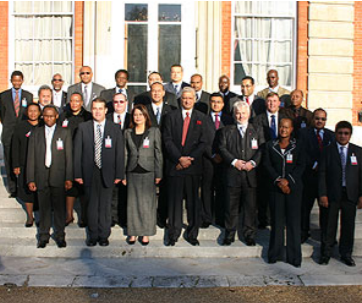
Senior law ministry officials from dozens of Commonwealth member countries met in London over the week of October 18th to discuss legal trends, share experiences and debate common challenges. For the first time, this year’s agenda included a focus on strengthening disaster laws, and the IFRC was invited to provide its experience and recommendations.
At a meeting of the “Senior Officials of Commonwealth Law Ministries” on October 18th, representatives considered a joint paper submitted by the IFRC and the ICRC on progress in the implementation of international humanitarian law and of IDRL. Speaking on behalf of the IFRC, British Red Cross Legal Advisor Claire Clement reported on the IFRC’s research on IDRL, the global progress in implementation of the IDRL Guidelines, as well as the findings of the British Red Cross’ recent study of IDRL issues in the United Kingdom.
As noted in final communiqué of the meeting: “There was growing interest on the part of Governments and other stakeholders in international disaster response, but the Meeting noted that some States’ domestic legislation needed amendment to facilitate prompt and effective response.”
On October 22nd, the “Law Ministers and Attorneys General of Small Commonwealth Jurisdictions” met and again considered IDRL, as well as a separate paper submitted by the IFRC on “strengthening disaster law in the era of climate change.”
In his presentation, the IFRC IDRL Coordinator David Fisher emphasized that the effects of climate change are already being felt in the numbers and impact of natural disasters, and that states should therefore be ensuring that they have adequate legal frameworks in place. Among the gaps that had been seen in some Commonwealth countries’ laws were a lack of adequate focus on, and mandated funding for, disaster risk reduction; inadequate or ineffectively implemented building codes and land management rules; a lack of clarity on the role of Red Cross and Red Crescent Societies and other civil society institutions; a failure to engage communities in building their own resilience; and the weakness of accountability mechanisms.
In their final communiqué the Law Ministers and Attorneys General “expressed gratitude for the detailed and practical suggestions in the paper which were very relevant given the location and economic circumstances of many of their jurisdictions and the crises some had already experienced. Issues raised in discussion included the stage reached in international negotiations on the global response to climate change, the need in each jurisdiction for advance budgetary provision by all levels of authorities, and the desirability of ‘Good Samaritan’ provisions limiting the potential liability of volunteers.”